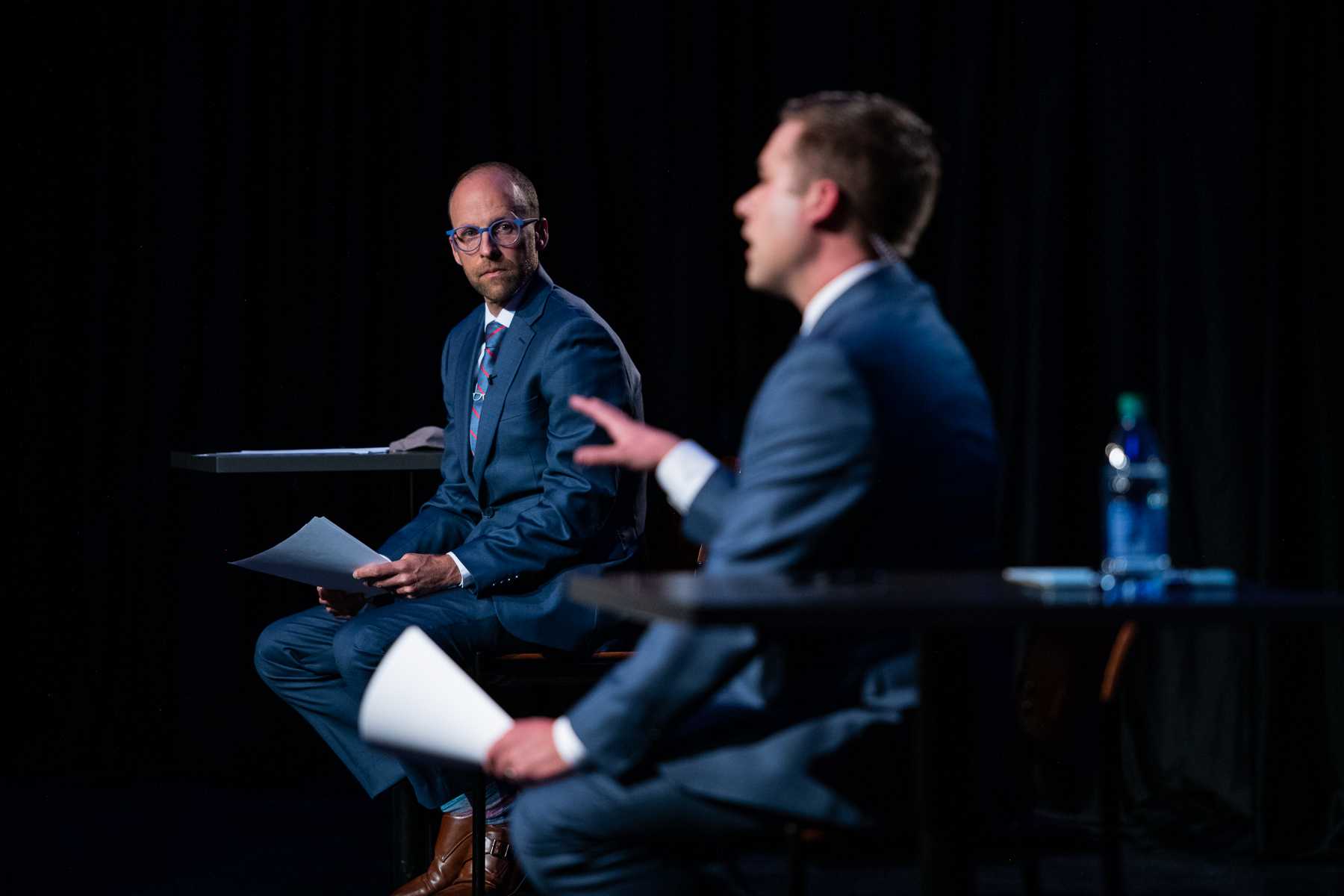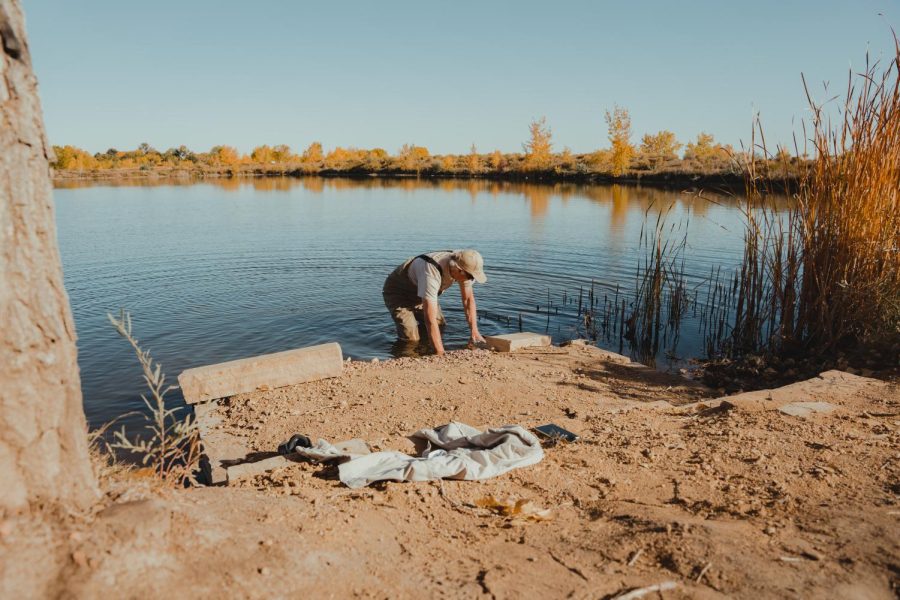Editor’s Note: This post is the first in a two-part series to fact check the final debate between Colorado Senate candidates Cory Gardner and John Hickenlooper. This race has been considered one which could determine the majority party in the United States Senate. Fact checks apply to the bolded statements they are near.

Kyle Clark: Colorado’s COVID-19 hospitalizations are at their highest point since the initial wave of the pandemic here back in the spring. Our test positivity rate just today at 5%, that’s according to public health experts. The same question to both of you to begin tonight: What is the single most important thing that we could do to improve our pandemic response and what or who is standing in the way? Mr. Gardner:
Cory Gardner: Well thank you, Kyle, thank you Channel 9News and thanks to Colorado State University. It’s great to be back on campus as a Colorado State University graduate. Great to be here and to all of the other sponsors of this event.
A couple things we have to do: number one, we must pass a relief package out of the United States Congress that follows up on relief packages that we’ve already passed. This package would include support for people with unemployment benefits, additional dollars for vaccines, dollars for child care, dollars for education, help for small businesses allowing Paycheck Protection Program dollars to be back into the hands of businesses to keep their doors open to make sure that we have a second draw on the loan. Those are the kinds of things that we need to be pursuing. We also need to make sure that we’re following social distancing guidelines and making sure that people are practicing good hygiene including wearing a mask.
But I will say this and start this evening off with what John Hickenlooper would have done in the United States Senate had he been there: he would have voted against the very bill that I described. Why? Because he said he would.
Hickenlooper was among many Democrats who criticized the Republican “skinny bill” which Senate Democrats have blocked, for not being comprehensive enough.
Source: Colorado Sun and Reuters
A bill that would have provided unemployment relief, a bill that would have provided relief for education, for childcare, new dollars for vaccines. We can’t afford to have somebody who refuses to support the people in Colorado in the Senate.
Kyle Clark: Mr. Gardner, thank you. Mr. Hickenlooper as he mentioned you, you have a bit of time for rebuttal if we want to have a longer discussion on this we can. I’ll restate the question for our viewers. What is the single most important thing we could do to improve our pandemic response and who or what is standing in the way?
John Hickenlooper: So, we did see here as an introduction what I think we’ll see a lot, that Cory Gardner is going to spend a fair amount of time on the attack. I think there’ll be a fair amount of distortion and exaggeration. But I’ll go to the question: the most important thing we can do is pass relief, make sure that relief gets passed out of the Congress. And, again, Cory and I agree on this. Actually, four days ago, Cory was emphatic that he thought that COVID relief should take precedence and be a higher priority than making sure that we rush through this Supreme Court nomination, which is where the Senate focus seems to be.
This statement is true. Both Hickenlooper and Gardner stated that Congress should prioritize passing a COVID-19 relief bill.
Source: CPR News
And I think the question has to be asked if COVID relief is the most important thing, making sure that we get testing capacity and the PPE for everyone, why—I mean, Cory could just say I will not vote to support this thing, this project, this Supreme Court nominee, if indeed the Relief Act doesn’t get passed first, and there are two senators that said yesterday that they were not going to vote for it. His priority and setting that priority clear would be a strong point toward getting relief.
Marshall Zelinger: We’re here in Northern Colorado, where the JBS meatpacking plant saw one of the largest COVID-19 outbreaks in the state. Mr. Gardner, you bragged about getting 5,000 tests for JBS workers. Union leaders say that those tests never arrived. JBS also didn’t test all its workers before reopening, as it had promised. Mr. Gardner, JBS is a significant donor to your campaign. Did that company properly protect its workers? And did you deliver the 5000 tests promised?
Cory Gardner: Well, thank you, Marshall, for the question. I worked very closely with the State of Colorado and Governor Polis. And in fact, if you look at the record, you will see that Governor Polis said every employee at JBS who wants to take a test can get a test. That’s not me saying it, that’s not the news saying it; that’s Governor Polis saying that there were tests for employees if they wanted them.
This statement is somewhat true. The state of Colorado set-up a testing site one mile away from the JBS plant in Greeley where employees could be tested for free. “To be clear, if JBS is willing to test all employees, we would be happy to work with them on making sure they have the supplies to do that. We can’t just go on their premises and test people, that’s why we did it a mile away.” – Governor Polis
Source: CPR News
We have to make sure that we’re protecting employees. We have to make sure that we have personal protective equipment for our employees, whether they’re working at a restaurant, whether they’re working at a meatpacking plant. We also have to recognize the challenges that our food supply system went through when we had the initial stages of the pandemic hit. Our workers at JBS were heroes and that’s why I worked closely with the governor to make sure that we had those tests that they needed to make sure that we had them.
This statement is true. Cory Gardner did work with Governor Polis to secure testing for JBS employees.
Source: JBS press release
And so, we need to continue that effort to provide a secure food chain, to provide secure food supplies for our country.
But when Governor Hickenlooper was in office he had a chance to get the personal protective equipment that we needed for the state, and yet he refused to provide the personal protective equipment stockpile that could have protected us.
This is the 2018 document the Gardner campaign is referencing in their claim that John Hickenlooper did not provide personal protective equipment. It is unclear which section of this document the Gardner campaign is explicitly referencing. The purpose of this document is stated as the following, “The purpose of the Colorado Crisis Standards of Care Plan is to provide a framework and tools for altering normal patient care, staffing, medical equipment, supplies, and treatment decisions of any type healthcare setting.” The plan specifics that it may not be useful depending on a future disaster scenario. Examination of this document does not prove or disprove Cory Gardner’s claim.
Marshall Zelinger: Before I allow a rebuttal from Mr. Hickenlooper. Did the 5000 tests arrive and the union is lying or—
Cory Gardner: Well you would have to be again, you would have to again, check with the governor. The governor said that they got all the tests that they needed for every employee if every employee wanted one.
This statement is somewhat true. See previous note.
Source: CPR News
Kyle Clark: Mr. Hickenlooper, you were name checked in this. Did you fail Colorado by not having proper PPE years earlier?

John Hickenlooper: No, that’s ridiculous. Governor Polis has done a remarkable job. And I think we should recognize that his efforts have been superlative. I talked to a number of the workers of JBS and they are emphatic that they did not get testing capacity, that they were asked and then forced to go back to work without having that knowledge of who’s infected and who isn’t. And I think that’s a question of willful negligence, that we ask them to go back and protect our source of food, without giving them the protections that any of us would expect.
Cory Gardner: May I respond?
Kyle Clark: You may.
Cory Gardner: Well, thank you. And again, what you heard from a former governor, is that he takes no responsibility for failing to prepare Colorado for a pandemic. We actually have a state audit that shows while he was governor, they failed to prepare the state of Colorado for pandemic.
There is no evidence that can be found to support this claim.
Communications problems still exist today, the same communications problems that he had when he was governor. And so, I don’t think he can pass the buck. We don’t need somebody in Washington D.C. who thinks it’s about himself refuses to take responsibility and won’t do the job for Colorado. He won’t do it here. He certainly won’t do it in Washington.
Kyle Clark: Mr. Gardner, thank you. Mr. Hickenlooper, question for you as we continue our discussion about the best way to get COVID relief to the people who need it: Democrats in Congress have loaded up some of these COVID relief bills and economic stimulus bills with a bunch of goodies for political allies of theirs. Whether or not you agree with that approach, it’s tough to say that that hasn’t slowed things down. For the sake of speed alone, should democrats in Congress quit doing that?
John Hickenlooper: I think what we need to get into Washington is this ability to actually negotiate. What’s been to me most frustrating is we haven’t seen any willingness on the Republican or the Democratic side to sit down and actually roll up their sleeves and find “Where do we agree? Where do we disagree?” and begin looking at it. We’ve gone six months now since we’ve had any relief, and people that stopped getting their unemployment insurance in July, their rent protections have gone by, they don’t have health care in many cases—this has gone on long enough. And yet one side or the other, continue to say, “Oh, no, it’s their fault,” and they’re pointing fingers. This is the status quo. This is what I want to go to Washington and change because we need negotiation. We need people to sit down and work out what the differences are.
Again, Cory said four days ago, in our debate that he would place a priority on this. If he stood up and said, “I’m not going to vote for justice until we get relief,” then we’d get relief, then we’d get negotiation. That’s what we need to move forward.
Kyle Clark: The time has expired. I didn’t hear an answer to the question, so I’ll ask again. I know you say both sides negotiate. I asked you about your side, the side that you might have some influence with. Do you think that Democrats should stop loading up these economic and COVID bills with goodies to get him through faster?
John Hickenlooper: Yes, certainly, if I was in Washington, I would do everything I can to make sure that there was an efficient process to get, you know, a lean bill to put forward.
Kyle Clark: OK, thank you very much. A few times tonight, you’re going to hear us—
Cory Gardner: Could I respond to that, if you don’t mind?
Kyle Clark: I think we’re going to move on and talk about the associated issue of health care now. If you really want to return to a topic, we can do that in Q&A.
A few times that you’re going to hear us reference disparity in Colorado. And that’s a project that we have at 9News that’s studying the impact of racial disparities in our state, and one of them is health care. The percentage of Black and Latino Coloradans with health insurance almost doubled with the expansion of Medicaid coverage and the Affordable Care Act. Mr. Gardner, if you succeed in getting rid of the Affordable Care Act, the loss of health insurance would disproportionately fall on Black and Latino Coloradans at the same time, that the pandemic is disproportionately affecting those communities. Has that situation given you any pause about trying to repeal the ACA?
Cory Gardner: Well, thank you, Kyle, I don’t think this has to be a zero-sum game. I don’t think it’s either the Affordable Care Act or nothing. In fact, Governor Hickenlooper has said that he wants to replace the Affordable Care Act with a plan that he led several years ago with Governor John Kasich.
This statement is false. Governor John Kasich and Governor John Hickenlooper authored a plan to make adjustments to the Affordable Care Act, not replace it.
Source: Washington Post
We need to make sure that we are helping minority, African-American, Black populations, Hispanic populations in this state and across this country. Under my plan, we will focus on a patient-centered care system, and we will allow people to increase their quality of care by decreasing the cost of care. We will do so through reinsurance programs and risk pools.
Statements on Cory Gardner’s website supports these action items, however, there is not extensive information on the specifics of this plan or how it would be accomplished.
Source: Gardner’s Campaign Website
We also have to recognize the work that we have done for minority communities across Colorado by growing our economy. Black families in this state in this country have seen their wealth on average grow by 33%. Hispanic families have seen their wealth grow by 65% as a result of the economic policies.
This is true, however, the wealth gap between Black and Hispanic families and white families is essentially unchanged.
Source: The Hill
It’s not a zero-sum game. Where I’m concerned though is Governor Hickenlooper’s plan to replace the Affordable Care Act, which would lead to a government run program that would take 176 million Americans’ insurance policies away from their workplace. That’s his plan. That’s irresponsible to destroy over 170 million Americans’ insurance.
This statement is mostly false. John Hickenlooper has stated that he wants to provide a government-run healthcare option that builds upon the Affordable Care Act—not one that replaces the ACA or requires public insurance.
Source: Hickenlooper Campaign Website
Kyle Clark: Thank you, Mr. Gardner. Mr. Hickenlooper, he described this plan that you’re interested in with former Governor Kasich, this is something that has come up in a number of your discussions. So 30 seconds now for you to tell us what is that plan? Are you still pursuing it? And what would it mean to Coloradans?
John Hickenlooper: So I only get 30 seconds to because you don’t want me to design or to talk, to say—
Kyle Clark: This is your rebuttal. And he is describing your plan. And I’m giving you 30 seconds to tell folks what that plan actually is.
John Hickenlooper: Okay. So John Kasich, the Republican governor of Ohio, who had also expanded Medicaid, we came together, not to replace the Affordable Care Act—I never said that. He never said that.
This statement is true. See previous note.
Source: Washington Post
We’re looking at ways that we can improve it, and especially focusing on ways that we could make the exchanges more cost effective for people, because that’s one of the problems. You know, the Affordable Care Act—the Republicans have tried to take it away, they’ve never allowed us to repair it or improve it, not repair but improve it. And again, and again, these attacks are threatening to dismantle (it) completely without any kind of suitable replacement.
Marshall Zelinger: Thank you, Mr. Hickenlooper. Mr. Gardner, the Affordable Care Act still exists, some might call that pre-existing. You’ve introduced an eight-line bill that you say will require insurance companies to cover pre-existing conditions. What part of that bill requires an insurance company to offer me coverage in the first place?
Cory Gardner: Yeah, the bill itself requires coverage for people with pre-existing conditions. That’s what the bill does. It’s maybe only eight lines.
This statement is true. The bill introduced by Cory Gardner does state that an insurance company may not impose a pre-existing condition exclusion.
Source: Congress.gov
I’ll remind you that we’re here today under a First Amendment, freedom of speech, freedom of press, freedom of religion, freedom to assemble. Obviously, that was 45 words long, and I think the First Amendment got it pretty doggone right. This is a guiding principle that both Democrats and Republicans actually agree to, that we will provide coverage for people with pre-existing conditions, and we will make sure that the insurance companies—that’s what my bill does—provide that coverage.
Although Cory Gardner’s bill is short and straightforward, many have criticized its effectiveness. A Colorado Public Radio investigation concluded that the bill does not provide adequate protections for individuals with pre-existing conditions if the Affordable Care Act did not exist.
Source: CPR News
Now, there may be some that disagree. Let’s work on it together to make sure that it’s right. That’s the guiding principle just as our First Amendment is the guiding principle for freedom of speech. Let’s make sure that that protection for pre-existing conditions continues.
What you heard Governor Hickenlooper say, though, is now he is saying he didn’t want to replace the Affordable Care Act, but he is on record saying he wants to go to a government-run health care system.
This statement is true. John Hickenlooper has stated he wants to provide a government-run healthcare option.
Source: Hickenlooper’s Campaign Website
The danger of that is the destruction that it would have the harm it would have on our rural hospitals. We’re already in the bottom half of access for health care thanks to his failed leadership while he was governor.
Marshall Zelinger: Mr. Gardner, I didn’t hear the answer to the part of the question of which part of the bill requires insurance companies to offer it to everyone and I’ll just add that the current Affordable Care Act includes a section entitled “guaranteed availability of coverage.” If the Affordable Care Act were to be repealed, that guarantee goes away with it. Where does that exist in your eight lines?
Cory Gardner: Marshall, the bill requires people to be covered if they have a pre-existing condition.
According to the CPR investigation referenced previously, the bill does not provide adequate protections for those with a pre-existing condition.
Source: CPR News
That’s what the bill does. It is a bill that provides that guidance, that principle that we will cover people with pre-existing conditions. That’s the bill now you may have a different interpretation. Every single one of the 11 bills that I’ve passed and signed into law they’ve changed from the time they were in committee to the time they got signed into law. If people want to make this better, let’s do it, but the guiding principle remains: I support and will demand and continue to demand coverage for people with pre-existing conditions. I will not, like Governor Hickenlooper, take away the insurance from 176 million Americans.
Marshall Zelinger: I just want to put a button on this: if the ACA were to go away and this bill exists, does everyone get coverage who wants it?
Cory Gardner: That’s my bill. My bill requires people—pre-existing conditions you’re saying? So yes, my bill requires people to get coverage for pre-existing conditions. If that’s the question, that’s the answer.
Marshall Zelinger: Thank you, Mr. Gardner.
Kyle Clark: Mr. Hickenlooper, you were the first person held in contempt by Colorado’s Independent Ethics Commission, which found that you broke the law in accepting illegal gifts. You’ve blamed Republicans, you’ve misleadingly claimed that you were exonerated on dozens of allegations, and you told Marshal that journalists should be protecting you on this. Do you regret breaking the law? And perhaps more importantly, will you change your behavior if voters return you to elected office?
John Hickenlooper: Well, I recognize that there were two reporting errors and the Ethics Commission found us in violation on those two occasions.
Colorado’s Ethics Commissioners found against John Hickenlooper in two out of six cases, four cases were dismissed. He was the first person held in contempt by the Commission. He was not exonerated.
Source: Colorado Sun
The Denver Post referred to it as a relatively minor and honest mistake. I can guarantee you they were inadvertent. We had a team of people that worked on this. But they obviously weren’t perfect. I think we should recognize that these allegations came from a dark money Republican organization that was created two days before all these allegations were filed. And their sole purpose was to try and create material for attack ads.
The intentions of the ethics complaint against John Hickenloooper cannot be proven; however, the complaint originated from Republican state House Speaker Frank McNulty under a new nonprofit, the Public Trust Institute. The complaint was filed with Colorado’s Independent Ethics Commission, who were asked to investigate 11 allegations from the previous 12 months. The Public Trust Institute claims to uphold Colorado’s state constitution and defend individual freedom, personal responsibility that Colorado was founded upon.
Source: Colorado Sun
And everyone in Colorado has seen this summer, those attack ads were relentless. And that’s bringing Washington politics to Colorado. Again, I paid the $2,800 fine,
This statement is true. John Hickenlooper did pay at $2,750 fine as a result of inappropriately accepted gifts.
Source: AP News
I take responsibility for that. I certainly will make sure that that never happens again. When I went I testified for three hours in front of the commission and told the truth to every question they asked.
Marshall Zelinger: Thank you, Mr. Hickenlooper. Mr. Hickenlooper. Another question about honesty and ethics comes from Ernest Lunning. It’s a recorded question, and he’s with our partners at coloradopolitics.com
Ernest Lunning (journalist from coloradopolitics.com): Governor, you’ve been endorsed by all the leading gun safety organizations who point to legislation you signed in 2013. But after signing those bills, you told Colorado sheriffs, that you hadn’t expected the magazine ban to be so controversial, and that you only signed it because a staff member who committed you saying one thing publicly and then privately saying the opposite. That’s something you accuse Senator Gardner of doing. How are you any different?
John Hickenlooper: Let me be very clear: I stand by my record on gun safety. We’re the first purple state to actually roll up our sleeves and pass universal background checks. To this day, Cory Gardner, Mitch McConnell don’t think that universal background checks really work.
This statement is true. Cory Gardner has stated his opposition to gun control and was criticized in 2018 for not supporting an effort to improve the National Instant Criminal Background Check System following a mass shooting in Texas. The NRA has also endorsed Gardner.
Source: Colorado Sun
They’re not sure it’s worth the $10. No one can get it onto the floor as long as Mitch Mcconnell is the majority leader of the Senate, because they don’t they just don’t think it’s effective enough. The bottom line is step back and look at this, Cory Gardener’s received almost $4 million in support from the NRA and gun manufacturers. Mitch McConnell’s received even more.
The National Rifle Association has funded Cory Gardner with almost $4 million in donations or supportive spending. Mitch McConnell has received about $1.2 million from the NRA.
Source: NYT and Brady: United Against Gun Violence
I mean, this is big money at play in politics, I think, and Cory Gardner’s received more, you know, corporate PAC money—$5.7 million—than any elected official in Colorado history.
According to OpenSecrets, the number quoted by John Hickenlooper is incorrect. However, it is unclear whether Hickenlooper is quoting all time figures or 2019-2020 figures. Cory Gardner has received $2,958,746 from Political Action Committees from 2019-2020.
Source: Open Secrets
And, you know, suddenly the corporations get these massive tax breaks.

Kyle Clark: Thank you, Mr. Hickenlooper. But if we could target the question to what Coloradans know, Coloradans know what our gun rights or gun control landscape looks like. So, perhaps you could explain, Mr. Gardner, what [are] the gun control laws we have in Colorado that you don’t think apply or should be passed nationwide? [Hickenlooper] talked about universal background checks, but we’ve got a lot of other things. Could you compare what we have here to what you’d like to see nationwide?
Cory Gardner: Well, look, I also want to reply to the governor’s attacks, because he has attacked quite frequently in this debate. And we haven’t always had a chance—I haven’t always had a chance to respond.
Look, I support our Second Amendment. And I believe we have laws in place that need to be enforced. But I don’t think that when it comes to prohibiting a sale between a father and a son, interfering at that level, that that’s a good thing for our country. Now, Colorado may be handling this in a different way. But I don’t think that we should infringe on those rights that our family sales have—you know, if I want to give my son the 12 gauge that I grew up learning to hunt with, I ought to be able to do that. If you look at some of the bans that the governor put in place, the experts said they had very limited effect and he lied to the county sheriffs about that. He lied to the county sheriffs about that effort. He wants a national gun license. He wants everybody in this state to have a national federal license for that firearm infringing on our Second Amendment rights.
Gardner is likely referencing Hickenlooper’s 2013 gun-control measures enacted following the Aurora theater shooting and Sandy Hook massacre. These measures included background checks for every gun purchased in the state of Colorado and limited firearm magazines to 15 rounds. Law enforcement members criticized this legislation, claiming it was unenforceable. Hickenlooper has said he would like to see these policies nationwide.
Source: Colorado Sun
What he’s saying here is different than what he actually wants to do in Washington. It’s this two John Hickenloopers: one seems to say something here, one wants to do something there. It is not right for our state.
Marshall Zelinger: Mr. Hickenlooper, for 30 seconds, I want to give Ernest a fair chance at an answer to his question. He has an introspective question about yourself saying something publicly saying something else privately and you spent your entire time telling me about Cory Gardner. The question was about you.
John Hickenlooper: Right. So again, I stand by my record on gun safety. My original intention was that we should have the magazine limits pass a year later. For a variety of reasons that moved forward rapidly. The bottom line is that we need—before the COVID we were having one mass shooting a day.
This is true. In 2019, the US averaged 1.19 mass shootings per day. (Defined as a minimum of four victims shot.) However, this trend does not seem to have been affected by the pandemic.
Source: Gun Violence Archive
And it’s long overdue that we begin looking at how we keep guns out of the hands of dangerous people. And universal background checks are an obvious way of doing that, making sure that we don’t have high capacity magazines available to whenever and whoever wants them is an equal challenge—
Marshall Zelinger: I have to say, 9News investigation has found that they’re still widely available, high capacity magazines, so that talking point we have proven hasn’t changed what exists in Colorado.
John Hickenlooper: If I can be—and I’m not trying to be argumentative—Oftentimes, when laws are passed, it takes a while, it takes years sometimes before they become the norm, they become part of culture. But if you don’t pass the laws, if you don’t set requirements, and everyone is going to buy a gun, should give them their driver’s license, we should be able to find out whether they—I mean, we found when we did they looked at the background checks for 2012, there were 138 people who’ve been convicted of homicide in Colorado. They tried to buy a gun and we stopped them.
It is unclear where Hickenlooper sourced these figures. However, 2012 did see a large surge in the amount of background checks being processed.
Source: Denver Post
[Brief moment of Gardner and Zelinger talking over each other]
Marshall Zelinger: Mr. Gardner, we’re going to have time to talk back and forth a moment. We’re going to shift now to justice Ruth Bader Ginsburg, who died 46 days before election day. Four years ago, Justice Antonin Scalia died 269 days before the election. And four years ago, you said, quote, “Our next election is too soon and the stakes are too high. The American people deserve a role in this process.” Now you’re okay with a vote on the nominee. My question is not about the Supreme Court. Why should anyone trust that you’ll stand by anything you’re telling us tonight?
Cory Gardner: Well, thank you, because in 2016, when this occurred, I was expressing the Senate’s ability to follow its requirement of advice and consent under the Constitution and to follow the precedent at the time, which was laid out by then Vice President Joe Biden during his time in the US Senate.
Gardner is referencing a 1992 statement from Joe Biden that the Senate should not hold confirmation hearings for a Supreme Court nominee until after that year’s presidential election. It is unclear why Gardner no longer stands by this precedent.
Source: Gardner’s 2016 statement
Today, we’re following the precedent laid out since the late 1800s. And continuing to adhere to the advice and consent of the United States Constitution.
The Constitution very clearly allows a president to nominate to the Senate to provide that advice and consent. We did not provide that consent in 2016 based on the precedent. As we have the nominations in the hearings today, we’ll move forward.
To be clear, though, the American people, the people of Colorado certainly deserve a chance to get an answer from Joe Biden and John Hickenlooper on what they want to do to the United States Supreme Court. It involves court packing. I asked John last week if he supported court packing. I don’t know if you want to answer that tonight, John. But I would just say this, Joe Biden doesn’t think the people of Colorado or this country deserve an answer on court packing. I hope that you agree Coloradans deserve an answer on whether or not you support packing the courts with additional judges.
Joe Biden has evaded answering questions regarding court packing. However, in a recent interview on CBS, Joe Biden has stated, if elected, he will convene a national commission to study the court system.
Source: NPR
Kyle Clark: All right, Mr. Gardner. Thank you very much. Mr. Hickenlooper. I do want to talk about this issue because it’s something that’s been in the news. Both you and Joe Biden have avoided answering whether you would support expanding the size of the Supreme Court or other measures that could be seen as either retaliation or reform based on what Republicans have done with the Supreme Court. So, let’s try this in a different format.
Let’s try these as: Yes, No or I don’t want to say. Do you support expanding or packing the Supreme Court if Republicans confirm Amy Coney Barrett? Yes, No, or I don’t want to say?
John Hickenlooper: It’s a hypothetical. I would support—Let’s put it this way. I don’t like the idea of court packing. We’re seeing it right now. We’re seeing court packing in full fury. And it doesn’t make any sense to me. I think if you get new people to Washington, you won’t have to do that kind of institutional change. And—

Kyle Clark: We’re going to go on to the next Yes, No, or I don’t want to say question. Do you support term limits for Supreme Court Justices?
John Hickenlooper: Again, there are so many variables I—No, I mean, I don’t support term limits at this point. But who can say in the future? Right?
Kyle Clark: Another idea has been rotating lower court judges on to the Supreme Court for fresh blood? Yes, no, or I don’t want to say?
John Hickenlooper: I’ve never heard that. So I haven’t thought about it.
Kyle Clark: That’s fair enough. Do you support expanding the size of lower courts to reshape the judiciary?
John Hickenlooper: Again, I haven’t seen the pros and cons. I have not delved into that.
Kyle Clark: Fair enough. Another thing that’s been talked about the Democrats could do in retaliation for what the Republicans are doing with the Supreme Court is creating statehood for the District of Columbia and Puerto Rico. Yes, no, don’t want to weigh in?
John Hickenlooper: No, I think those are different issues that have been discussed long before we got into this court packing—
Kyle Clark: It’s being discussed in the context of a retaliatory action, because of the court packing.
John Hickenlooper: Just for the record long, before we saw this kind of court packing, I have said that I think Washington D.C. should be a state. So I’m on the record of that, but it has nothing to do with court packing,
Kyle Clark: Understood. And Puerto Rico?
John Hickenlooper: Puerto Rico, I don’t think I’m on the record, but I could be persuaded. I mean, again, this is no different or similar in many ways to Hawaii when we brought Hawaii into as part of the United States.
Kyle Clark: Okay, thank you very much. Mr. Gardner on the court. President Trump’s Supreme Court nominee Amy Coney Barrett, she’s personally opposed to abortion, and she said today that Roe vs. Wade is not a super precedent. It’s not safe from being reversed. Last week, there were a couple of conservative Justices on the court that suggested that gay marriage should also be overturned. Are you comfortable with overturning a woman’s right to an abortion and gay Americans right to marry?
Cory Gardner: Both cases are settled law. I think we’ve heard that discussion quite a depth today actually about settled law and the precedent and that precedent should be respected. But I also want to make sure that we understand here what court packing means. It is an Orwellian spin in newspeak to say that court packing is what is taking place today. Court packing for 100 years, 150 plus years in this country’s history has been identified as adding judges to the lower courts or to the U.S. Supreme Court until you get enough judges on the court to rule your way.
Now, John knows exactly what court packing means. He’s trying to hide tonight behind the lawful filling of nominations and approval by the United States Senate. So, the question is to Governor Hickenlooper, do you support adding justices to the Supreme Court? More than 9, 10 or 11? That’s the question you should answer because that’s the definition of court packing. Ruth Bader Ginsburg opposed it.
Kyle Clark: So, just as a quick follow up, then, on the principle that you just outlined. One consequence of court packing or expanding the court is that Democrats do it, then Republicans do it again, the Democrats do it again, you just get to this larger and larger and larger Court, which could water down the judiciary. I assume, based on what you’re saying, that if you were reelected and continue to serve in the Senate, that if Democrats expand the quarter pack the court that you would adamantly oppose Republicans doing it in return?
Cory Gardner: Absolutely. Look, the nine has worked for over 150 [years]. We don’t need more. It’s worked for 150 years. It’s too bad that Governor Hickenlooper can’t admit that.
Marshall Zelinger: Well, Mr. Gardner, this is the part you’ve been waiting for. You’ve left a question dangling out there. This is the opportunity to ask each other a question. It’s a 60-second answer. It’s a question from you. I just heard one. I don’t know. Maybe it’s the same one you’re about to ask. But Mr. Gardner, I’ll let you ask the first question.
Cory Gardner: Well, thank you for the question. Over the last several months, we have seen a great division in our country. We’ve seen racial injustice. We’ve seen racial inequality. We’ve seen the murder of George Floyd on television. We’ve seen defund police movements across the country. We’ve seen violence this weekend with the death of a protester. Governor Hickenlooper, you supported a fund called Chinook that included funding for Recreate 68, a radical organization that demanded violence at the 2008 convention in Denver, that supports defunding the police, that supports violence against police. Do you stand by your support today for Recreate 68?
A Denver Post article claims that John Hickenlooper was a co-founder of the Chinook Fund and that the Chinook Fund gave $4,000 to Recreate 68 in 2007. However, the Chinook’s Fund website does not state John Hickenlooper as a co-founder of the organization.
Source: Denver Post
John Hickenlooper: I don’t know anything about Recreate 68.
The truth in this statement is unknown. Recreate 68 is one of the many recipients of the Chinook Fund.
Source: Chinook Fund
Chinook was a foundation where community activists trying to improve their own community had the responsibility and the opportunity to give grants to all kinds of people, all kinds of organizations. I am completely—I was not involved. I haven’t been involved in a grant from Chinook from the Chinook fund in 30 years.
See above note.
So, again, I don’t—the whole point of Chinook is they’re trying to allow people that opportunity to make decisions that improve their own community.
Marshall Zelinger: Mr. Hickenlooper, you can ask a question of Mr. Gardner now.
John Hickenlooper: So, Senator Gardner, you have talked about the meeting you convened in January, really one of the first meetings to recognize the seriousness of COVID-19. And then I think there are a couple senators who actually sold stock there. But then three weeks later, you came back to Colorado Springs. There was a large rally with President Trump, many thousands of people, most of them without masks and shoulder-to-shoulder were there. As you stood side-by-side with Donald Trump, you didn’t warn anyone, any of the Coloradans about the risk that they were facing by being in that rally. Why was that?
Cory Gardner: Yeah, thank you, Governor Hickenlooper. Look, I held the very first briefing in the United States Senate, demanded the very first briefing in the United States Senate to make sure that we heard from Admiral Giroir, Dr. Fauci, Dr. Redfield to discuss what was happening with this novel coronavirus.
Cory Gardner did issue a statement in January regarding the novel coronavirus. On the same day a Senate briefing was held regarding the outbreak but it is unclear to what extent Gardner played a role in organizing this meeting.
Source: Gardner’s statement
I had hoped that everybody in the Senate would attend this briefing. Unfortunately, there were only about 12 people because at the very beginning of the virus, January, February, people were encouraging, like Nancy Pelosi to go to Chinatown, to Mayor de Blasio encouraging people to go out and eat.
This statement is false and originates from exaggerated claims made by President Trump.
Source: Factcheck.org
There were mistakes at every level of government in the very beginning days, including the experts who said we don’t know if masks are effective or not. We have to improve our response every single minute of the day. That’s our local levels, our state and federal levels. And that’s what I continued to focus on. I wish more people would have attended that very first hearing.
Kyle Clark: A clarifying question, Mr. Gardner, because there’s something that we want to bring up as well. At the time of that February rally, when you were shoulder-to-shoulder with President Trump, we now know, thanks to the journalist Bob Woodward, what the President actually thought of COVID-19 at that point, that it was tremendously serious, way worse than the flu, airborne, so forth. Did President Trump tell you before you stood next to him in that crowd that he knew all those things? Did you have that knowledge?
Cory Gardner: No, I did not. But we knew this is something that we had to deal with. We knew that we had something from China that we didn’t understand. China was lying to us at the time. China was lying to the world saying it couldn’t be transmitted the way that we now know that it can. The WHO was covering up for China.
This statement is somewhat true. It has been found that officials in the city of Wuhan initially attempted to hide information from central Chinese leadership and World Health Organization. However, the WHO did not cover-up any of China’s misreporting. The situation is highly nuanced.
Source: NYT and Business Insider
And so look, we have to make sure that we don’t say follow the same mistakes that Nancy Pelosi made inviting people to Chinatown or Mayor de Blasio inviting people to go out to dinner. But I also think it’s important that we stand up to places like China. Governor Hickenlooper just last week said that China is not a problem; China isn’t a bad country.
Several sources have reported this statement to be true. However, all of these sources are partisan and sensationalist.
Source: Colorado Politics
Kyle Clark: I wasn’t asking about China or Nancy Pelosi or anybody else. I was asking you whether you wish the President had leaned over and told you what he knew, which was this is really bad, way worse than I’m saying and here we are with a crowd of however many—
Cory Gardner: Look I don’t know what he knew or didn’t know. I certainly wish that we would have had all of the information at the very beginning of this. The World Health Organization and China, what they were lying about. Look, I think if you look at what Nancy Pelosi—I bring that up because Nancy Pelosi was saying at the beginning of this, ‘let’s go out to Chinatown’; Mayor de Blasio, ‘let’s go out —’
This statement is false. See above note.
Source: Factcheck.org
Kyle Clark: I think we’ve covered this now—
Cory Gardner: I’m just saying that there were a lot of mistakes early on throughout this entire—on all sides of this.
See Part Two of this series for the remainder of the debate.
Meg Metzger-Seymour is the Editor-in-Chief of College Avenue and can be reached at editor@collegeavemag.com, or on Twitter @megmetzsey





































